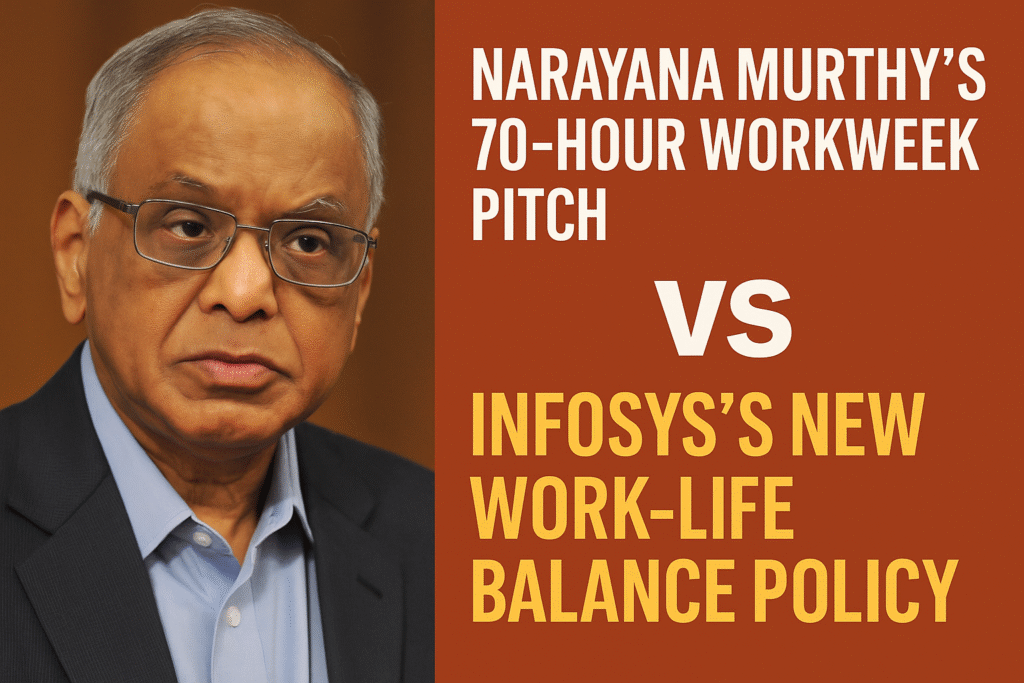Indian IT giant Infosys and its iconic founder N. R. Narayana Murthy are making headlines again this time for opposing views on employee work culture. While Murthy has publicly advocated for a 70-hour workweek for young Indians to help accelerate national development, Infosys has now launched an initiative urging employees to prioritize work-life balance.

Let’s explore the full story, reactions, and what this means for India’s evolving workplace culture.
What Did Narayana Murthy Say?
Narayana Murthy, co-founder of Infosys and one of India’s most respected business leaders, reignited debate last year by stating that young Indians should work 70 hours a week to help the country compete with developed nations.
“India’s work productivity is one of the lowest in the world. Unless we improve our work productivity, unless we reduce corruption… India will be left behind,” he said in a podcast.
His comments sparked widespread discussion, with some praising his commitment to national growth, and others calling the idea unrealistic and harmful to employee well-being.
Infosys Takes a Different Turn
In an unexpected move that seemingly contrasts its founder’s ideology, Infosys has now launched a workplace campaign focused on work-life balance:
Key Highlights of Infosys’s New Policy:
- Monitoring work hours: The company is tracking remote work data to detect if employees are working more than 9.15 hours/day over 5+ days in a week.
- Personalized HR emails: Employees exceeding the limit receive emails suggesting:
- Taking breaks and time off
- Delegating tasks
- Discussing workloads with managers
- Health concerns addressed: The company cited rising stress and health issues such as burnout, high blood pressure, and heart problems from excessive work hours.
This approach is being seen as a modern, employee-centric step—especially in the post-pandemic era where mental health and flexibility matter more than ever.
Public Reaction: Mixed But Thought-Provoking
Murthy’s comments and Infosys’s move have gone viral on social media, sparking thousands of memes, polls, and debates. Two Sides of the Debate:
| Supporters of Murthy | Critics of Murthy |
|---|---|
| India needs hard work to grow | Promotes toxic hustle culture |
| Youth should sacrifice to build the nation | Ignores burnout and health issues |
| Like Japan & Germany, long hours brought growth | Success comes from smart work, not long work |
What This Means for Indian Professionals
This clash of ideologies presents a larger question for today’s workforce:
Should India’s youth work longer hours to catch up with global economies, or should companies focus on sustainable productivity?
Also read :Karnataka 2nd PUC Exam‑3 Results 2025 Out on karresults.nic.in — Just 22.78% Students Pass
Trend Shift in Indian IT:
- Gen Z and millennial employees now value flexibility, mental health, and quality of life.
- Companies like Infosys are responding with well-being policies to retain top talent.
- Experts believe the future of work is not about more hours, but about better systems, automation, and skill development.
Conclusion
Narayana Murthy’s vision of a 70-hour workweek may come from a place of patriotism and personal discipline, but Infosys’s latest employee care campaign reflects today’s workplace realities.
As India grows into a global tech leader, companies must strike the right balance between ambition and well-being. The real productivity boost will come not just from longer work hours, but from smarter work culture and empowered employees
